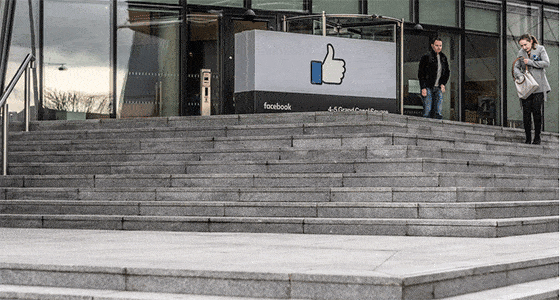Pictured: The entrance to Facebook’s international headquarters in Dublin
According to a study by IHS Markit, Facebook’s data centre in Clonee, Co. Meath, contributes greatly to the Irish economy
Facebook’s data centre in Clonee, Co. Meath, helps drive the local economy and create employment, according to a new study by IHS Markit.
IHS Markit, the London-based global information provider, conducted the study to gauge the economic contributions made by Facebook’s data centres in Europe.
It was found that, through capital expenditures, operational expenses and direct wages, Facebook’s data centres contribute greatly to the economies of Ireland, Denmark, and Sweden.
From 2011-2018, Facebook’s data centre in Clonee stimulated €1.549 billion of combined direct, indirect and induced sales activity in the country and helped stimulate €602 million worth of Irish GDP.
The centre also drove €358 million of labour income, supported 1,316 jobs per year, and accounted for 2% of all sales in the Irish construction sector.
Facebook data centres directly sourced expenditures totalling €2.8 billion goods and services across Ireland, Denmark, and Sweden, which generated €2.3 billion in sales and supported 2,816 jobs annually across the three countries.
The Clonee data centre has recently been highlighted for being powered by 100% renewable energy, making it one of the most energy-efficient data centres in the world. This was achieved through working with Brookfield Renewables to tap into wind energy assets in Ireland.
It was announced in March 2019 that construction was to begin on two new halls at the Clonee site, effectively doubling the size of the data centre in Co. Meath.
In a post uploaded by the Clonee Data Centre, Facebook said the following:
“Facebook is committed to having a positive impact on local communities. We work to hire and source materials locally in order to bring additional investment and jobs to the regions that host us. We also implement sustainable practices and build some of the most energy efficient data centres in the world.
“Facebook’s data centres house the infrastructure that makes it possible to connect billions of people. They also help us accommodate the growing number of photos and videos being shared and help us scale as we create more data intensive and immersive experiences through live video, 360 photos and videos, and virtual reality.”
Facebook concluded by saying the following: “We look forward to continuing to invest in the vitality of communities like Clonee.”





